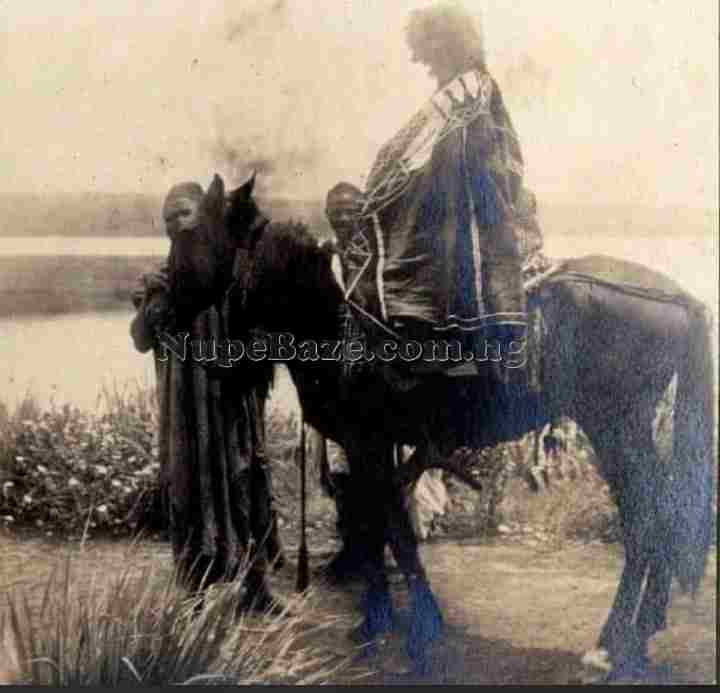Olivia Temple,¹ Professor E.O. Erim,² Akpenpuun Dzurgba,³ and other have related that the Igala traditions maintain that the Igala people originated from a prehistoric kingdom of Apa. But, Ambassador Solomon Adama Yisa wrote that Apa was an ancient Nupe kingdom located in Nupeland.⁴
Apa was known to Nupe historians as Epa.⁵ Alhaji Saidu Ibrahim Madaki Nupe wrote that the Agaie-Lapai general area of Nupeland was originally populated by the Epa or Apa Nupe people before the Dibo-Ganagana came and chased them out of Nupeland.⁶ Dr. Aliyu Faruk said that toponyms like Lapai, Pai, Paiko, Kupa, Gupa, Fogbe, Fatigi (Patigi), Lapagi (Lafiagi), etc., are still reminiscent of that prehistoric kingdom of Apa in Nupeland to this day.⁷
When the Epa or Apa Nupe people were chased out of Nupeland they migrated down the River Niger to become the various people of Middle Belt and Southern Nigeria we know today as the Igala, Idoma, Igbira, Agatu, Koton-Karifi, and many others who still trace their origins to Apa.⁸ Professor Elizabeth Isichei confirmed that many Middle Belt and Southern Nigerian people trace their origin to Apa.⁹
Olivia Temple, on the authority of Captain F. Byng-Hall, wrote that the Igala continued to be known as the Apa or Ife even after they had settled down at Idah among the Akpoto people.¹⁰ But Mustapha Muhammed said that Apa, Afa, Ifa, Ife, Nife, Nufe, and Nupe are all one and the same national name pronounced differently due to dialectal variations.¹¹ In other words, the Igala were also known as the Apa, Ife or Nupe.¹² The Apa were also known as the Apa-Koro or Koro-Apa which the Hausa chroniclers and colonial scribes transcribed as Kororofa.
Professor A.E. Afigbo,¹³ Daniel Denga¹⁴ and Ambassador Solomon Adama Yisa¹⁵, among several others, all then wrote that Apa and Kororofa are one and the same. The colonial anthropologist Charles Kingsley Meek, who studied the Kororofa phenomenon in meticulous details, wrote that Kororofa and Nupe are synonymous and are one and the same national name referring to the riverine Apa people.¹⁶
This means that the Igala people, whether they claim Apa or Kororofa origins, are still a Nupe people by origin either way out. Bishop Samuel Ajayi Crowther actually recorded an Igala tradition to the effect that the Igala capital of Idah and the Igala kingdom were originally founded by a Nupe king and his people who came from the Nupe riverine city of Raba.¹⁷ It is on this note that the renowned Professor A.E. Afigbo ¹⁸ and the well-known dialectologist O.O. Akinkugbe¹⁹ both wrote that the Igala people originated from the western, that is Nupeland, section of the Niger-Benue Confluence area.
Ambassador Solomon Adama Yisa also wrote that the Igala people originated from Nupeland.²⁰
References:
1 – Temple, O. 1922. Notes on the tribes, provinces, emirates and states of the northern provinces of Nigeria, Lagos: C.M.S., London: James Townsend & Sons, p. 147.
2 – Erim E.O. (1981). Idoma nationality 1600-1900: Problems in studying the origin and development of ethnicity.
Enugu: Fourth Dimension Publisher, p. 48.
3 – Dzurgba, A. (1996). Tiv people and the challenge of contemporary business: implications of the historical and cultural factors for the development of business among the Tiv. A. Dzurgba. Pp. 23-24.
4 – Yisa, Solomon Adama. Nupe Heritage Dictionary. Kochita Resources Limited, (Minna, 2013), p. 22.
5 – Ibrahim, S. (1992). The Nupe and their Neighbours from the 14th Century, by Saidu Ibrahim, Published by Heinemann Educational Books (Nigeria) Plc., Ibadan, 1992, p. 48.
6 – Ibrahim, S. (1992). The Nupe and their Neighbours from the 14th Century, by Saidu Ibrahim, Published by Heinemann Educational Books (Nigeria) Plc., Ibadan, 1992, p. 48.
7 – AF (I) Faruk, Aliyu, Ilorin, history researcher and university staff, interviewed on several occasions throughout 1995.
8 – Ismail, A. (2011). Modern Nupe Nation, Nupeko Magazine, December, 2011. Bida.
9 – Isichei, E. (1997).
A History of African Societies to 1870. Cambridge: Cambridge University Press, p. 235.
10 – Captain Byng-Hall as an authority in Temple, O. 1922. Notes on the tribes, provinces, emirates and states of the northern provinces of Nigeria, Lagos: C.M.S., London: James Townsend & Sons, p. 147.
11 – MM (M) Muhammed, Mustapha, Minna, history lecturer, interviewed several times in 1994.
12 – MM (M) Muhammed, Mustapha, Minna, history lecturer, interviewed several times in 1994.
13 – Afigbo, A.E. (2005) Nigerian History, Politics and Affairs: The Collected Essays of Adiele Afigbo. Toyin Falola (ed.). Africa World Press, p. 66.
14 – Denga, D.I. (1995). Benue State, the land of great potentials: a compendium. Rapid Educational Publishers, p. 40.
15 – Yisa, Solomon Adama. Nupe Heritage Dictionary. Kochita Resources Limited, (Minna, 2013), p. 22.
16 – Meek, C.K. and Palmer, H.R. (1969). A Sudanese Kingdom, An Ethnographical Study of the Jukun- Speaking Peoples of Nigeria. New York: Negro Universities Press, p. 17.
17 – Crowther, Samuel. Journal of an Expedition up the Niger and Tshadda Rivers, CMS, (London, 1855), pp. 65-66.
18 – Afigbo, A.E. (2005) Nigerian History, Politics and Affairs: The Collected Essays of Adiele Afigbo. Toyin Falola (ed.). Africa World Press, p. 65.
19 – O.O. Akinkugbe quoted in Oduwobi, O.T. (1969). “The Question of Ijebu Origins: Are the Ijebu Yoruba?”, Being Text of the 10th Lecture Series of the I-JAY Klub Delivered at the Club House, Stadium Road, Ijebu-Ode, on 28 April 2013, p. 6.
20 – Yisa, Solomon Adama. Nupe Heritage Dictionary. Kochita Resources Limited, (Minna, 2013), p. 315.
| Author: | Ndagi Abdullahi |
|---|---|
| Royal Title: | Amana Nupe |
| Whatsapp Contact Only: | 08137982743 |
